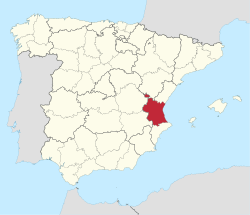Valencia province
|
Province of Valencia Provincia de Valencia (Spanish) Província de València (Catalan) |
||
|---|---|---|
| Province | ||

Platja de la Patacona d'Alboraia
|
||
|
||
 Map of Spain with Province of Valencia highlighted |
||
| Country | Spain | |
| Autonomous community | Valencian | |
| Capital | Valencia | |
| Area | ||
| • Total | 10,763 km2 (4,156 sq mi) | |
| Area rank | Ranked | |
| 2.13% of Spain | ||
| Population (2013) | ||
| • Total | 2,566,474 | |
| • Rank | Ranked | |
| 5.45% of Spain | ||
| Demonym(s) | Valencians | |
| Official language(s) | Spanish and Catalan | |
| Parliament | Cortes Generales | |
Valencia (Spanish: [baˈlenθja]) or València (Catalan pronunciation: [vaˈlensia]) is a province of Spain, in the central part of the Valencian Community. Of the province's 2,566,474 people (2013), one-third live in the capital, Valencia, which is also the capital of the autonomous community. There are 265 municipalities in the province.
Although the Spanish Constitution of 1812 loosely created the province of València, a stable administrative entity does not arise until the territorial division of Spain in 1833, remaining today without major changes. The Provincial Council of Valencia dates from that period. After the Valencian Statute of Autonomy of 1982, the province became part of the Valencian Community.
It is bordered by the provinces of Alicante, Albacete, Cuenca, Teruel, Castellón, and the Mediterranean Sea. The northwestern side of the province is in the mountainous Sistema Ibérico area. Part of its territory, the Rincón de Ademuz, is an exclave sandwiched between the provinces of Cuenca and Teruel. The province is historically subdivided into the comarques of Camp de Túria, Camp de Morvedre, Canal de Navarrés, Costera, Hoya de Buñol, Horta de València, Horta Nord, Horta Oest, Horta Sud, Valencia, Requena-Utiel, Rincón de Ademuz, Ribera Alta, Ribera Baixa, Safor, Los Serranos, Vall d'Albaida and Valle de Cofrentes.
...
Wikipedia

